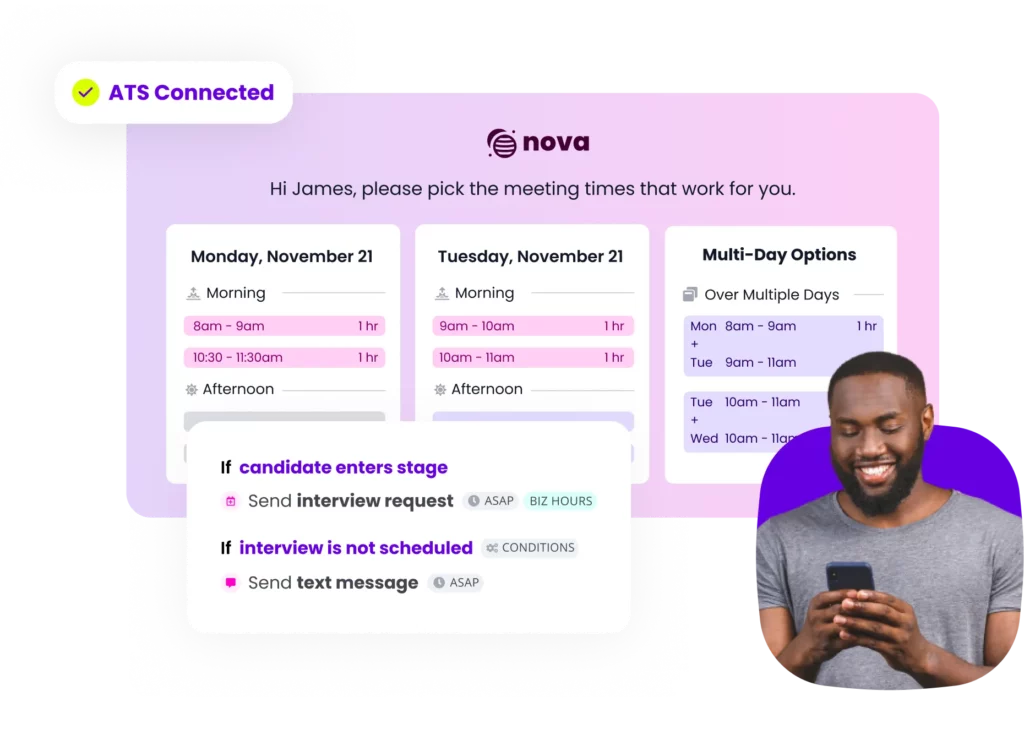Have you ever received an email that you just know was written by AI? I’m guessing you didn’t think, “Cool! A message written by a natural language processing model!” Instead, it probably felt a little cold and impersonal.
Unfortunately, mis-use of AI has depersonalized a lot of human-driven business interactions, and that depersonalization is especially risky in talent acquisition.
The hiring process should be about making connections, understanding people, and finding the best fit for both the candidate and the company. But when AI is used poorly, it can strip away the humanity from these interactions, leaving candidates feeling like they’re just another data point.
This is where human-centric AI comes in. It’s not just about making processes more efficient; it’s about enhancing the human elements that are crucial in hiring. In this article, we’ll explore what human-centric AI is, why it’s essential for talent acquisition, how it compares to traditional AI, the benefits it offers, and how platforms like GoodTime are leading the way.
What is human-centric AI?
Human-centric AI is a forward-thinking approach to artificial intelligence that prioritizes the enhancement of human capabilities over the replacement of human roles. At its core, human-centric AI is designed to augment the human touch, ensuring that technology serves as an ally to human intuition, empathy, and decision-making rather than an impersonal substitute.
Traditional AI systems often focus solely on efficiency and automation, aiming to streamline processes by reducing the need for human intervention. While this can lead to significant time savings, it also risks creating experiences that feel cold and disconnected — and ultimately less effective. Human-centric AI, on the other hand, is built on principles that value and preserve the human elements of interaction and decision-making.
At GoodTime, our human-centric AI philosophy guides every innovation we introduce and every feature we develop. This approach involves:
- Empathy and personalization: Ensuring that AI systems can understand and respond to the nuanced needs of both candidates and recruiters.
- Ethical considerations: Designing AI that operates transparently, respects privacy, and actively works to eliminate biases.
- Empowerment: Providing tools that enhance human decision-making and efficiency without overshadowing the importance of human judgment and creativity.
By embedding these principles into our AI, we aim to create hiring solutions that not only improve efficiency but also foster more meaningful and positive interactions throughout the recruitment process.
Why a human-centric approach to AI is crucial in talent acquisition
In today’s hiring climate, maintaining the right balance between technology and the human touch is more important than ever. Here’s why a human-centric approach to AI is particularly crucial:
- Enhanced candidate experience: The hiring process is a candidate’s first interaction with a potential employer. Human-centric AI ensures that this experience is engaging, respectful, and personalized, leaving candidates with a positive impression of the company.
- Improved recruiter efficiency: By automating repetitive tasks and providing actionable insights, human-centric AI frees up recruiters to focus on the more strategic and interpersonal aspects of their job. This not only improves efficiency but also enhances job satisfaction among recruiters.
- Bias reduction: Traditional AI systems can inadvertently perpetuate biases present in historical data. Human-centric AI actively works to identify and mitigate these biases, promoting fairer and more inclusive hiring practices.
- Ethical transparency: Human-centric AI emphasizes transparency in how decisions are made, ensuring that both candidates and recruiters understand and trust the AI-driven processes.
These features enhance the overall hiring experience by maintaining a personal touch and ensuring that both candidates and recruiters feel supported.
Hung Lee has over 15 years of experience as a recruitment leader and is now Editor and Community builder at Recruiting Brainfood, a leading recruitment newsletter. He applauds the approach of companies like GoodTime for centering, rather than replacing recruiters: “Amazing product ideas emerge when you suddenly stop thinking about getting rid of the recruiter and instead think about how you help them.” You can hear his thoughts on human-centric AI below.
Risks of non-human-centric AI in hiring
Relying solely on traditional AI in hiring can lead to several risks:
- Loss of Personalization: Candidates may feel like just another number in the system, leading to a negative experience and potential loss of top talent.
- Perpetuation of Bias: Without measures to identify and mitigate biases, traditional AI can reinforce existing inequalities.
- Lack of Trust: Opaque decision-making processes can erode trust among candidates and recruiters, leading to skepticism and resistance to AI tools.
- Reduced Human Insight: Over-reliance on automation can diminish the role of human judgment and creativity, leading to less nuanced and thoughtful hiring decisions.
Incorporating human-centric AI into hiring processes addresses these risks and creates a more balanced approach that leverages the strengths of both technology and human insight. By focusing on empathy, fairness, and transparency, human-centric AI ensures that the hiring process is not only efficient but also engaging and inclusive.
Benefits of human-centric AI in hiring
Human-centric AI offers a multitude of benefits that go beyond mere efficiency, transforming the hiring process into a more engaging, fair, and effective experience for all parties involved. Here are some of the key benefits:
Improved candidate experience
Human-centric AI significantly enhances the candidate experience by ensuring personalized and empathetic interactions throughout the hiring process. Candidates feel valued when they receive timely, relevant, and personalized communications. AI-driven systems can provide updates, feedback, and support tailored to each candidate’s journey, making them feel more connected and engaged with the prospective employer. This not only improves candidate satisfaction but also boosts the employer’s brand reputation.
Enhanced decision-making for recruiters
By providing actionable insights and data-driven recommendations, human-centric AI empowers recruiters to make better, more informed decisions. AI can analyze vast amounts of data to identify patterns and trends that may not be immediately apparent to human recruiters. This includes highlighting the best candidates based on specific criteria, suggesting improvements to the hiring process, and offering feedback on interviewer performance. These insights enable recruiters to optimize their strategies and ensure they are making decisions that align with the organization’s goals and values.
Increased efficiency and reduced time-to-hire
While maintaining a focus on the human touch, human-centric AI automates repetitive and time-consuming tasks such as interview scheduling, sending follow-up emails, and processing applications. This automation frees up recruiters to focus on higher-value activities, such as engaging with candidates and strategic planning. As a result, the overall time-to-hire is significantly reduced, allowing companies to fill positions faster and with greater efficiency.
“Today’s TA teams must streamline their processes and lean into tools that drive measurable ROI without sacrificing the personal touch that is so crucial. That’s why human-centric AI is the future of TA.”
-Charles Mah, Chief Customer and Operations Officer, GoodTime
Better alignment with company culture and values
Human-centric AI helps ensure that hiring decisions are more closely aligned with the company’s culture and values. By considering a broader range of factors, such as cultural fit and potential for long-term success, AI systems can identify candidates who are not only qualified but also likely to thrive within the organization. This leads to better retention rates and a more cohesive team.
Fairness and inclusivity
Traditional hiring processes can be prone to unconscious biases that affect decision-making. Human-centric AI actively works to mitigate these biases by analyzing data objectively and providing recommendations based on merit rather than subjective criteria. This promotes a fairer and more inclusive hiring process, helping organizations build diverse and high-performing teams.
“TA pros are the people that find and secure your best people — they’re the ones that really build your company. We don’t believe in taking the ‘human’ out of HR.”
-Ahryun Moon, CEO of GoodTime
Scalability
Human-centric AI allows companies to scale their hiring processes without compromising on quality. Whether a company is hiring for a few positions or hundreds, AI can handle the increased workload efficiently. This is particularly beneficial for organizations experiencing rapid growth or those with high-volume hiring needs.
Specific examples of human-centric AI in action
To illustrate these benefits, let’s look at some specific examples of human-centric AI technologies in hiring:
Automated interview scheduling
Human-centric AI systems can handle complex scheduling tasks, including coordinating multi-day interviews and managing last-minute changes. This ensures that both candidates and interviewers have a seamless and hassle-free experience.

Intelligent interviewer selection
AI can match candidates with the most suitable interviewers based on factors such as skills, availability, and past performance. This ensures that interviews are conducted by the best possible person for the job, improving the quality of the hiring process.

Candidate and interviewer communications
Personalized and timely communications are essential for maintaining engagement throughout the hiring process. AI-driven systems can automate and customize these interactions, ensuring that candidates feel supported and informed at every stage.

Data, insights, and feedback mechanisms
AI provides valuable insights into the hiring process, highlighting areas for improvement and offering actionable recommendations. Feedback mechanisms can also be automated to gather input from candidates and interviewers, helping organizations continuously refine their processes.

By leveraging these technologies, organizations can create a hiring process that is not only efficient but also deeply human-centric, ensuring that both candidates and recruiters have a positive and meaningful experience.
How to embrace a more empathic approach to AI in hiring
Human-centric AI is transforming talent acquisition by combining efficiency with empathy. It enhances the candidate experience, empowers recruiters with actionable insights, reduces biases, and promotes fairness. By focusing on human elements, it creates a more engaging and inclusive hiring process.
GoodTime exemplifies these principles with features like automated interview scheduling and intelligent interviewer selection, demonstrating how AI can streamline hiring while maintaining a personal touch.
Ready to see human-centric AI in action? Explore how GoodTime can revolutionize your hiring process.
AI for more human hiring
Interview scheduling is just the start. Use human-centric AI to elevate your hiring experience while automating 90% of interview scheduling tasks — for any role, in any place, at any scale.





